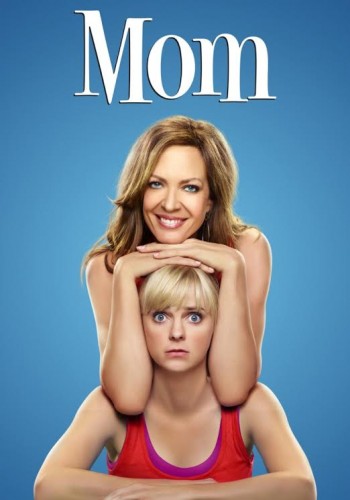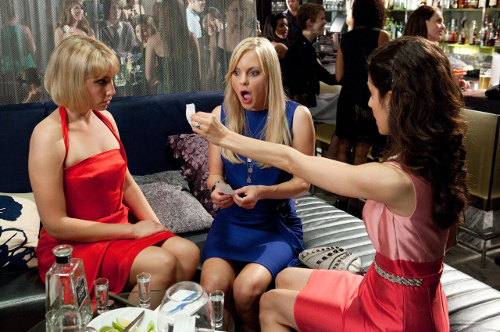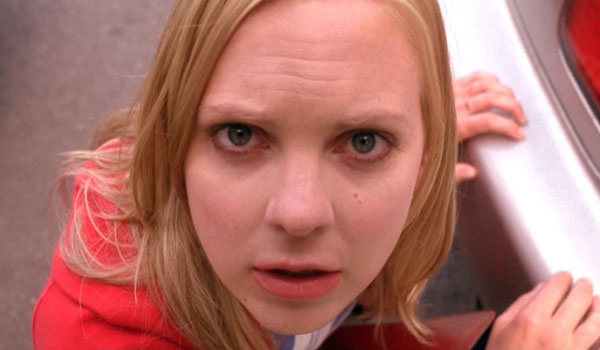
This is a guest post by Jessamyn Neuhaus.
I’m a feminist and I’ve loved television all my life. Now TV has finally started to love me back with some of the most interesting and intelligent female lead characters ever seen in any entertainment medium. But there’s still lots to loathe, with gold-digging hussies, hysterical bridezillas, and helpmeet housewives aplenty on TV.
So when a show—particularly a show on one of the elderly big three networks—gives us something better, we should pay attention. Mom, the latest sitcom spearheaded by longtime TV writer and producer Chuck Lorre, is something better. Featuring two strong female leads, this CBS show about Kristy (Anna Faris), a recently sober single mother of two who is rebuilding a relationship with her own negligent mother Bonnie (Allison Janney), is not a flawless feminist text. But for those of us who believe mainstream popular culture can be a place for both reinforcing and challenging gender stereotypes, there are at least three reasons to be watching when the second season of Mom begins on Oct. 30.
1. Allison Janney is perfect.
Lorre has an uneven record when it comes to his female characters. Roseanne and Grace Under Fire were high points, and I think we can all agree that Two and a Half Men is the lowest of the low points. Even Lorre’s best shows are characterized by an unabashed mainstream commercialism, so it’s not surprising that some aspects Mom are cookie-cutter mediocre sitcom.
For instance, TV’s version of “working class” is frequently cringeworthy and Mom is no exception. Lorre has gotten props for his blue collar characters, but on Mom, a single waitress (admittedly, at an upscale restaurant) with two children and sober for only six months can afford to rent a three-bedroom home in a safe neighborhood and provide her family with smart phones, laptops, video games, and Anthropologie bed linens. Sitcoms don’t set out to be “realistic” of course, but it’s jarring to see the supposedly broke family enjoying luxury consumer goods. Kristy also sports a haircut and color that costs more per month than many viewers’ rent or mortgage payments.

In addition, many of the men on Mom are rather shallowly drawn male caricatures, from the loveable high school stoner who impregnates Kristy’s daughter Violet, to the loveable stoner ex-husband who impregnated Kristy years ago, to the whiny married-to-a-battle-ax boss with whom Kristy has a brief affair.
Then there’s the widely panned laugh track. At this point, a laugh track (even if it’s ostensibly recorded live audience laughter) is more than outdated. It undermines the show’s comedic impact.
And finally: the fat suit Farris donned in “Sonograms and Tube Tops.” It’s offensive, and it’s also just not funny. Really. Not. Funny.
Mom’s not perfect. But Allison Janney is.
Not to say that Faris isn’t good too. She has excellent comedy timing and physicality, and also handles some of the more serious moments in the show well, giving Kristy emotional depth within the limitations of a comedy-tackling-serious-subjects-with-a-light-touch framework. Farris has often deftly undercut the typecasting trap of being a cute petite blonde girl, and she does so on Mom.
But Faris’ solid skills are outshone in every scene with Janney, whose crackling delivery and unique physical presence exude…well, the only word is power. Power that is remarkable to see so confidently exercised by a female character on a traditional sitcom. Bonnie has a lot of past problems (teenage pregnancy, drug dealing) and current flaws (tenuously sober, intermittently employed, and highly self-absorbed). She’s making some amends to Kristy now, but she wastes no time on pointless guilt or doubt. Bonnie is always beautifully self-assured. It’s a real pleasure to see, on a traditional sitcom, a strikingly tall, handsome (not “pretty”), deep-voiced woman OVER 50 YEARS OLD strut her stuff without being made into a buffoon or an object of pity.

Janney won an Emmy this year for her work on Mom, as well as numerous other awards and accolades, and rightly so.
2. Female sexuality and reproduction are multifaceted and messy.
When the pilot ended with Kristy’s discovering that Violet might be pregnant, I almost gave up on Mom. Another TV teenage pregnancy, because that’s the most interesting thing that can happen to a high school girl, and naturally she’ll never consider an abortion because abortions don’t exist in TV Land? No thanks. But as the season continued, I was won over by some of the nuances and complexities of female sexuality and reproduction on Mom, including Violet’s pregnancy.
Although sitcomish in many ways, the pregnancy story depicted Violet truly struggling to decide whether to raise the baby herself or give it up for adoption. Violet changes her mind several times, up to and throughout her labor and delivery in the season finale. It was an emotionally difficult process, which included choosing potential adoptive parents and convincing her boyfriend it’s the right decision on “Clumsy Monkeys and Tilted Uterus,” and a tearful but determined goodbye to the baby after the birth. Meanwhile, Bonnie and Kristy support Violet’s decision but also experience it as a deep loss—though the emotional toll doesn’t stop Kristy from picking up her camera phone during Violet’s labor to “make a video for you to watch the next time you think about having unprotected sex.”

The National Council for Adoption praised the story line, and it was a refreshing change from the standard flippant sitcom treatment of birth mothers and adoption. (Ironically, one of the most egregious examples of such stories was the 2004 episode of Friends in which a birth mother played by Anna Faris is so nonchalant that she doesn’t even realize that she’s having twins.)
There are other things to applaud about the show’s depictions of sex, which are often humorous without falling into gratuitous references to horniness and/or female genitals (Two Broke Girls, I’m looking at you). The show begins with Kristy’s bad decision to sleep with her married boss but she clearly knows it’s stupid and soon ends it. She tries to make smarter sexual decisions, postponing intercourse with a nice guy in an effort to maintain her sobriety and to explore the long term potential of the relationship. But in “Nietzsche and Beer Run,” she falls immediately into bed and almost-love with a smolderingly hot philosopher/fireman (and who could blame her? What a combo!). This guy has a drinking/drugs/womanizing problem and for most of “Jail Jail and Japanese Porn,” Kristy teeters on the edge of messing up her life big time to be with him, but then snaps out of it and cuts him loose. Kristy also occasionally sleeps with her ex-husband, but with a minimum of drama. In contrast to TV’s tired “woman in her 30s who can’t find a husband or manage her romantic life,” Kristy’s sex life is convincingly messy but never demeaning or disempowering. She’s unashamedly sexual, gladly accepting the gift of a vibrator from Bonnie and joking that the only thing that could possibly cause her to relapse and drink again would be “I have a stroke and forget how to masturbate.” But sex is just one part of her life, and although she’s doing some fumbling, she’s not overwrought or hung up about it.
Bonnie’s healthy sexual appetite is sometimes portrayed as unfortunate promiscuity and sometimes embarrassing for Kristy, but Bonnie is never belittled by the writers for being a sexual person. She’s absolutely, completely confident in her attractiveness and picks up desirable (often younger) men with flawless and humorous ease that never stoops to presenting her as a laughingstock. Though Bonnie frets about the onset of menopause in “Estrogen and a Hearty Breakfast,” most of the time her sexuality is sophisticated and fluid in a way that’s unusual for network TV. In “Corned Beef and Handcuffs,” she smoothly comes out the victor in a kinky standoff with a pervy chef, and in “Leather Cribs and a Medieval Rack” casually reveals that she had a long time relationship with another woman. “You were gay?” gasps Kristy. “Not gay so much as temporarily disgusted with men,” smiles Bonnie. She knows she’s sexy, but more importantly, so do the viewers because the show does not depict Bonnie as a pathetic old cougar.
3. The moms on Mom are not “moms.”
Mom, in its title and in its content, strikes a blow against one of the more insidious aspects of gender ideology today: “the new momism.” Identified by Susan J. Douglas and Meredith W. Michaels in The Mommy Myth, the new momism sets impossibly high ideals and norms for good mothering. Douglas and Meredith argue that one symptom of the new momism is the widespread use of the term “mom” itself. They point out that “Mom” is what kids call mothers and in many ways it can be patronizing and problematic when adults use “mom” to describe women.

On Mom, the mothers are loving, but not even close to ideal moms. And not in a merely goofy Modern Family kind of way, but in seriously screwed up ways. Both Bonnie and Kristy are trying to reestablish trust with their daughters after years of addiction and neglect. Their AA friend Marjorie (Mimi Kennedy) is estranged from her children due to her past drug and alcohol abuse, and another friend, Regina (the always awesome Octavia Spencer) has to leave her son behind when she goes to jail for embezzlement. These are mothers who have messed up, but they are still trying to do right by their kids.
At times, Mom offers funny yet astute counterpoints to our society’s relentless glorification of mothering. For example, in “Loathing and Tube Socks,” Kristy’s son Roscoe’s run out of clean clothes and in desperation, she stops at a dollar store (a small but noteworthy nod to Kristy’s financial pressures) on the way to school to buy him new underwear. But Roscoe balks because they have anchors on them and “anchors are stupid” and he “likes his underwear to make sense.” “Oh for God’s sake, it’s just a design! It doesn’t mean anything,” she snaps, adding “I am not having this conversation with you.” Then a store employee won’t let Roscoe use the restroom to change. Kristy freaks, whips open a beach towel in front of Roscoe, and orders him to take off his pants and change right there in the aisle. The scene captures the frenzied moments when real-life parenting is absurdly exasperating; when you find yourself acting like a total jackass—arguing about anchor underpants with an eight-year-old, for example—and it’s not funny ha ha, it’s funny because it’s so frustrating and ridiculous that you either laugh or completely lose it.
It’s no coincidence that Mom drew the ire of One Million Moms, a conservative media watchdog group that seeks to eliminate immorality and vulgarity (their words) in entertainment. In an undated post titled “CBS Makes ‘Mom’ Look Bad,” the group called for moms to protest Mom, pointing specifically to the show’s portrayal of mothering: “If possible, try to imagine the worst possible characteristics a mother could have. Then multiply that by ten….” The post listed numerous examples of what was deemed “unacceptable content” on Mom but I think it’s the show’s deliberate challenge to the new momism that really ticked off One Million Moms.
Kristy, Bonnie, and even Violet are not sitcoms’ typical “good moms.” Rather, they are interesting, often complex, women who are definitely worth watching.
Jessamyn Neuhaus is a professor U.S. history and popular culture at SUNY Plattsburgh. She is the author of Housework and Housewives in American Advertising: Married to the Mop (Palgrave Macmillan, 2011).















